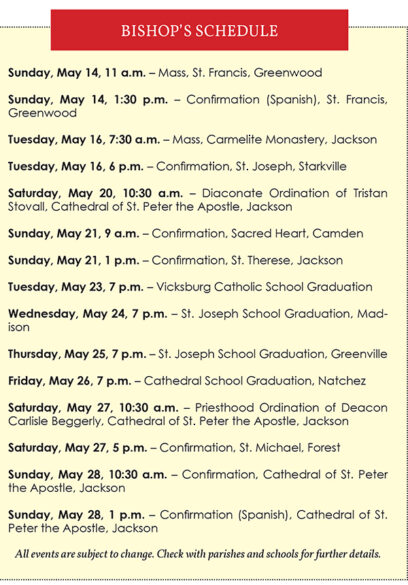
Bishop’s schedule


By Bishop Joseph R. Kopacz, D.D.
The final day of the Easter Octave is Divine Mercy Sunday. This year we celebrated the day of the resurrection of the merciful Lord from the dead for the 24th time since the Jubilee Year of 2000 with the canonization of St. Faustina when St. John Paul II called the universal church to a feast of divine mercy on the second Sunday of Easter.
Divine Mercy Sunday focuses on the compassionate love of God given through Christ’s death, burial and resurrection. As Pope John Paul II stated, “Divine Mercy reaches human beings through the heart of the Christ crucified.”
The iconic symbol of divine mercy is marked by the two rays of light, red and blue, shining from the heart of the risen Lord who revealed to Sister Faustina that they represent blood and water illuminating the world.

We immediately think of the testimony given by the Evangelist John, who, when a soldier on Calvary pierced Christ’s side with his spear, sees blood and water flowing from it. (John 19:34) Moreover, if the blood recalls the sacrifice of the Cross and the gift of the Eucharist, the water, in Johannine symbolism, represents both Baptism and also the gift of the Holy Spirit. (John 3:5; 4:14; 7:37-39)
The Lord Jesus in the miracle of the resurrection transformed death into life, despair into hope, and fear and shame into peace and promise. Each of the four Gospels testify to the power of the resurrection and on Divine Mercy Sunday the Gospel of John takes center stage with his Pentecost moment.
The apostles were huddled together in fear after the crucifixion with their world shattered like broken glass. Traumatized and deeply wounded by the crucifixion the risen Lord came into their midst and bathed the 11 with God’s mercy, peace and the gift of the Holy Spirit. He showed them his hands and his side, even inviting Thomas to touch the wounds inflicted by the crucifixion. His wounds healed their shattered spirit. His cleansing gift of peace with the outpouring of the Holy Spirit empowered them to live in a way they had never known.
Before breathing the gift of the Holy Spirit into his born-again friends the crucified and risen One gave them their mission. “As the Father has sent me, so I send you,” and in these words and in this action, we see the plan of God’s salvation let loose in the world.
The church’s mandate is the same yesterday, today, and until the Lord comes again, i.e. to announce the Good News of Jesus Christ and to make disciples of all the nations. In the light of Divine Mercy, St. Paul provides some wonderful imagery regarding the vision for our mission. All of us are called to be servants of Jesus Christ and stewards of God’s mysteries, ambassadors of Jesus Christ and ministers of reconciliation.
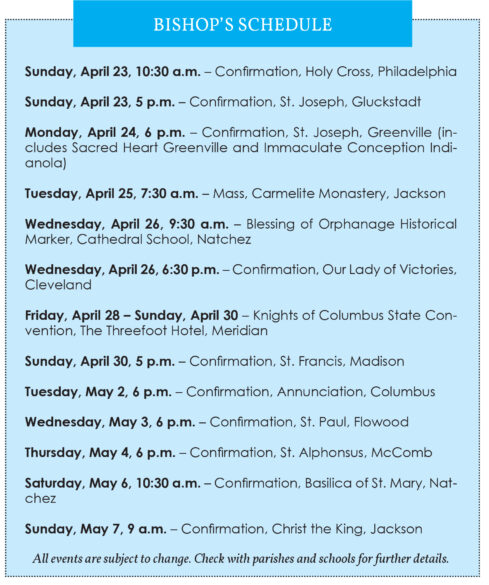
The gift of divine mercy we have received; we ought to give as a gift. During the synod process in our diocese those who participated voiced a strong concern for a greater unity that addresses the wounds and polarization in our church and in society. Divine mercy is that leaven in the bread that can transform this brokenness.
For example, within the body of the church the victims of sexual abuse must be provided every opportunity for healing, peace and new life. The perpetrators and those who failed to protect need the mercy and forgiveness of God in large doses. Wherever the wounds exist in his Body, the church, the Lord stands ready to heal. In Christ we want to be new creations. As we look inward to restore the life in abundance that Jesus promised, we also live and move, and have our being in the world to announce the Gospel bringing this Good News of the Kingdom of God to our world.
In the spirit of Divine Mercy, the prayer attributed to St. Francis of Assisi comes to mind as a beacon for the work entrusted to us.
“Lord, make me an instrument of your peace. Where there is hatred, let me sow love. Where there is injury, pardon. Where there is doubt, faith. Where there is despair, hope. Where there is darkness, light. And where there is sadness, joy. O divine master, grant that I may not so much seek to be consoled as to console, to be understood as to understand, to be loved as to love. For it is in giving that we receive; it is in pardoning that we are pardoned. And it is in dying that we are born to eternal life. Amen.”

By Bishop Joseph R. Kopacz, D.D.
Alleluia, Christ is risen! Palm Sunday’s Passion Narrative by St. Matthew was the bridge that led the church this year through suffering and death into the light of Christ’s resurrection. This can bring us abundant peace and comfort, yet we do not shed the chains of suffering as if the resurrection covers it over with a blanket of devotion.
The great mystery of our faith is uniquely contained in the Lord’s final words before dying on the Cross in Matthew and Mark’s Gospels. “My God, my God, why have you abandoned me?” Is this a cry of despair from the Lord, or an act of profound trust and love arising from the throes of suffering? In the face of unspeakable suffering that engulfs our world the Christian is impelled to walk the narrow road, and wrestle with the mysteries of suffering and evil in the light of the resurrection.
Chiara Lubich offers her deepest desire as a disciple of the Lord. “I wish to bear witness before the world that Jesus forsaken has filled every void, illuminated every darkness, accompanied every solitude, annulled every suffering, cancelled every sin.”
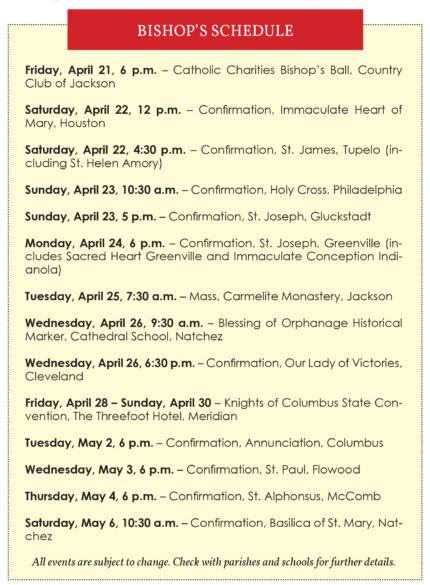
Mark, along with St. Matthew leave the world hanging with the Lord’s final words of abandonment that are actually the opening lines of Psalm 21. In the first half of the psalm, we discover that the jaws of suffering can inflict unrelenting agony. But the believer is directed to persevere and to know that God is love and does not abandon his creation.
This is evident in the closing verses from which the following is taken. “For he has not despised or abhorred the affliction of the tormented, but has heard when they cried out … From you comes my praise in the great congregation. Those who seek God shall praise the Lord! May your hearts live forever! Our posterity shall serve God; the faithful shall tell of the Lord to the coming generations and proclaim God’s deliverance to a people yet unborn.” Although suffering is ever at hand, in the power of the resurrection abandonment is not the last word. Rather, it is the love of God that is as strong as death because Christ is risen!
Pope Francis, for the 400th anniversary of the death of Francis de Sales quoted from the great saint’s masterpiece, A Treatise on the Love of God in his pastoral letter, Totum amoris est (All is Love).
“In Holy Church, everything pertains to love, lives in love, is done for love and comes from love. The source of this love that attracts the heart is the life of Jesus Christ. ‘Nothing sways the human heart as much as love, and this is most evident in the fact that’ Jesus Christ died for us; he gave us life through his death. We live only because he died, and died for us, and in us.”
For this reason, St. Francis de Sales could eloquently describe Calvary as “the mountain of love.” For there and there alone, do we come to realize that “it is not possible to have life without love, or love without the death of the Redeemer. Except there, everything is either eternal death or eternal love, and the whole of Christian wisdom consists in knowing how to choose well between them.”
Chiara Lubich, the founder of the Focolare Movement that is anchored in the love of Jesus crucified and risen, writes gracefully on the passion of Jesus as the fountain of love. Just like Jesus, who through his suffering gave humanity joy here in earth and lasting joy in the next life, we too can acquire joy by accepting the various kinds of anguish we experience for ourselves and for others.
“Love impelled him to the Cross, considered foolishness by many, but this foolishness has saved humanity and has formed the saints. Suffering teaches what you cannot learn by any other means. It teaches with the greatest authority. It is the teacher of wisdom. Therefore, let’s not be afraid if we learn that suffering awaits us.”
The Father, Jesus, Mary, us. The Father permitted that Jesus feel forsaken by him, for us. Jesus accepted being forsaken by the Father, and deprived himself of his mother, for us. Mary shared the forsakenness of Jesus and accepted being deprived of her Son, for us. We, therefore, have been put in first place. It is love that does such crazy things…
Alleluia, Christ is risen! Happy Easter!
By Bishop Joseph R. Kopacz, D.D.
The pastoral visit to Ireland, my second as the bishop of Jackson, delayed over two years by pandemic restrictions, was successfully undertaken earlier this month. Father Mike O’Brien, recently retired, greeted Msgr. Elvin Sunds and me at the Dublin airport, and for the next eight days he provided the best of hospitality; as well as, his well-honed driving skills over hill and dale around a large swath of Ireland.
The primary purpose for this pastoral trip was to visit with, and to gather the available family members of the priests who dedicated their lives to priestly ministry in Mississippi.

Even if we wanted to combine a pastoral visit with a round or two of golf, March is not the time to do it. On the day we arrived we were greeted with two to three inches of snow. I asked how much snow annually falls in Ireland and was informed that it is about two to three inches and a bit. Perfect!
Our signature event occurred when more than 100 family members descended upon St. Patrick Church in Newbridge, one of the churches in the Ballygar parish whence came 17 missionary priests over the years to the Diocese of Natchez-Jackson, now the Dioceses of Biloxi and Jackson.
Some traveled for over two hours to be together and to give thanks to the Lord for the gifts of family, faith and priesthood. The accompanying Mass photos illustrate a full church and the concelebrating clergy. At the altar from left to right is Father Douglas John Zaggi, pastor, Msgr. Elvin Sunds, Father Louis Lohan, myself, Bishop Kevin Doran, the Ordinary of the Diocese of Elphin, Father Mike O’Brien and Father P.J. Curley.
Celebrating this special Mass of Thanksgiving at St. Patrick’s Church brought to light the words of Ireland’s first missionary priest, St. Patrick.
“In the knowledge of this faith in the Trinity, and without letting the dangers prevent it, it is right to make known the gift of God and his eternal consolation. It is right to spread abroad the name of God faithfully and without fear, so that even after my death I may leave something of value to the many thousands of my brothers and sisters — the children whom I baptized in the Lord. I didn’t deserve at all that the Lord would grant such great grace. It was something which, when I was young, I never hoped for or even thought of.” (C 14-15)
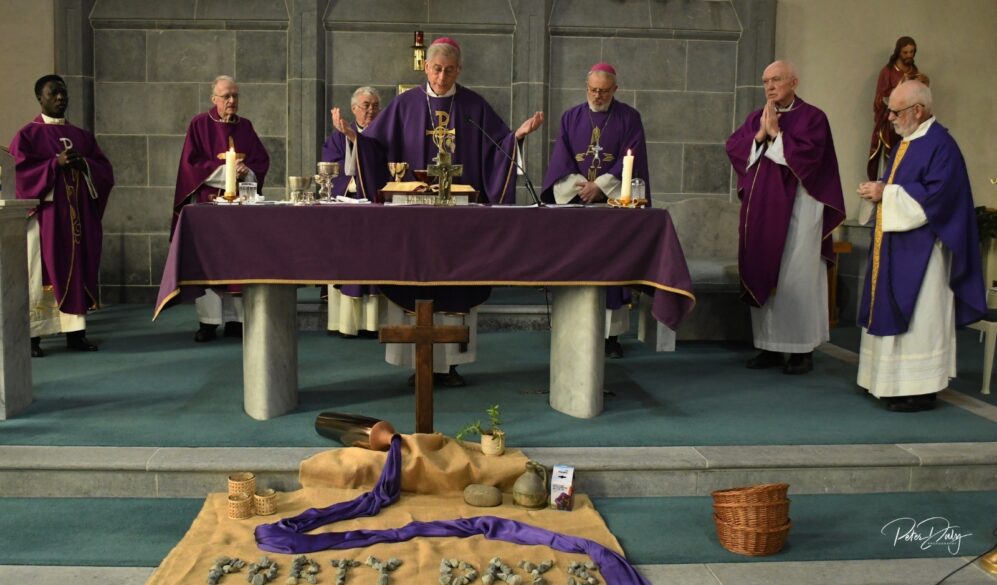
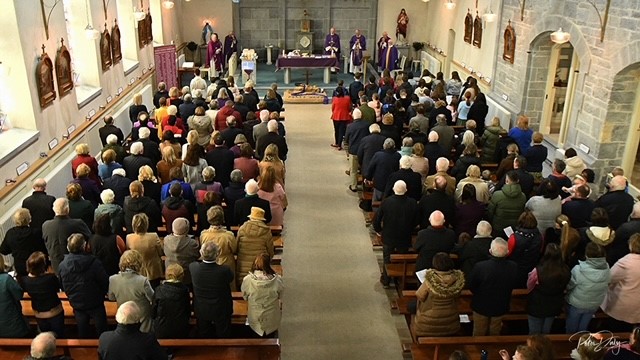
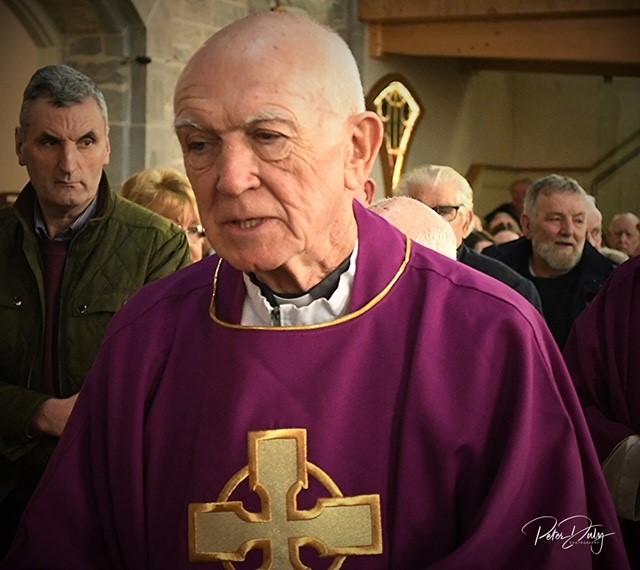
Until recent times, that zeal for the Good News of Jesus Christ captured the imaginations of many Irish women and men who spent their lives as religious and priests “making known the gift of God and his eternal consolation.” For this we gave thanks. A packed parish hall of the faithful enjoyed an Irish feast of meat, potatoes, veggies and fine desserts. You’ve got to love those mashed potatoes.
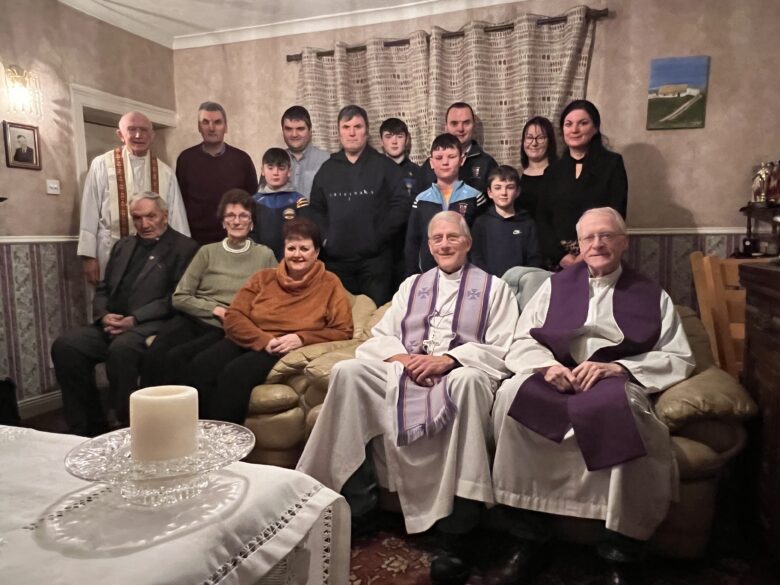

Bishop Kopacz, Msgr. Sunds and Father Mike pose for a photo with the family of Father Brian Carroll after Mass in the family sitting room. Afterwards, they all warmed up by the turf fire and some Irish coffee.
Although the Sunday celebration in Newbridge was the centerpiece of the pastoral visit, there were many opportunities to cherish God’s goodness. Near to Roscommon, the home base during our stay, is the homestead of Father Brian (Speedy) Carroll’s brother, Anthony Carroll. On a balmy 38-degree night with the wind whipping and the rain falling sideways we paid our respects at Father Carroll’s gravesite. Requiescat in pace! Then onto the family homestead to celebrate Mass in the Sitting Room with the turf fire glowing brightly where Father Carroll had celebrated many a Mass over the years. The beloved hymn to the Blessed Mother, “Our Lady of Knock” brought our service to a stirring conclusion. Afterwards we added to the warmth of the evening with some fine Irish coffee.
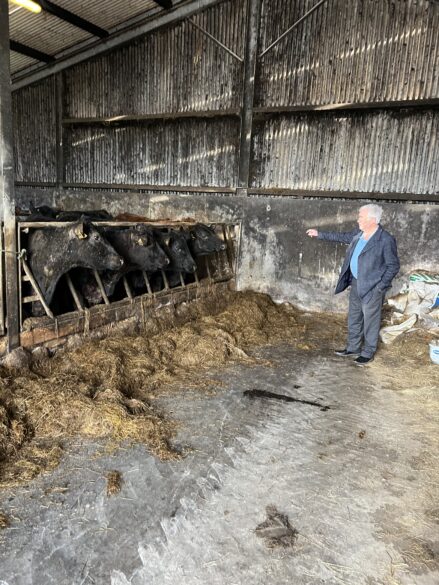

Father Louie Lohan keeps his cows entertained by practicing his homily. On right, a visit to a poultry farm run by Father Noonan’s nephew.
Father Louie Lohan was very instrumental in organizing the visit with Father Mike O’Brien, and he was proud to show us his family farm and livestock. Some might say that he is a gentleman farmer, but it is evident from the photos that he is nearly as much at home in the barn as he is at the altar. Indeed, it appears that he prepares his homilies by addressing the cows so that his preaching does not go in one ear and out the udder. (The humor is compliments of Father Speedy.)
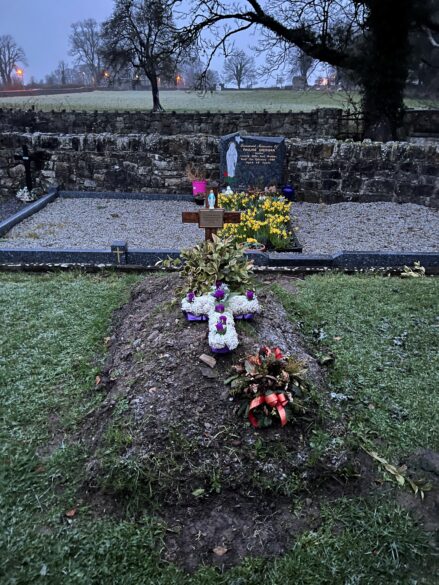
Throughout the eight days we were welcomed into many homes for delightful visits. These drop-ins included members of the O’Brien, Atkinson, Curly and Noonan families to name several. Father Curly was home for the funeral of a sister-in-law and we spent an hour or two at the family homestead. They spoke cheerily of their growing up years in their cozy home, and Father P.J. demonstrated that he could still position himself at full stature under the mantle of the fireplace as he did as a young lad.
During the final days of the visit, we took an overnight trip to visit the Michael Noonan family near Adare in the Limerick region in the southwest. It was nearly six years ago when we spent time with him and his family shortly after the death of Father Patrick Noonan. After paying our respects at Father Noonan’s grave with his nephew, Michael Noonan, we enjoyed a lively visit with his brother Michael and family, sharing many fond Mississippi memories.
Of course, there were many more precious moments that took place, too numerous to count. God willing, the third pastoral visit will occur sooner than the gap of five and a half years between the first and second sojourns.
Until then, dear friends in Ireland, “May the road rise up to meet you; may the wind be always at your back; may the sun shine warm upon your face, the rains fall soft upon your fields, and until we meet again may God hold you in the palm of His hand.”
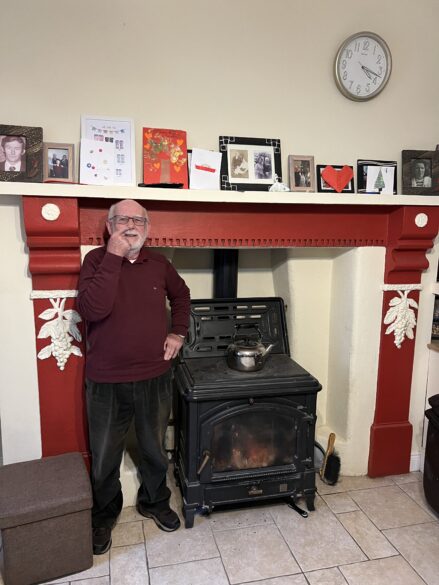
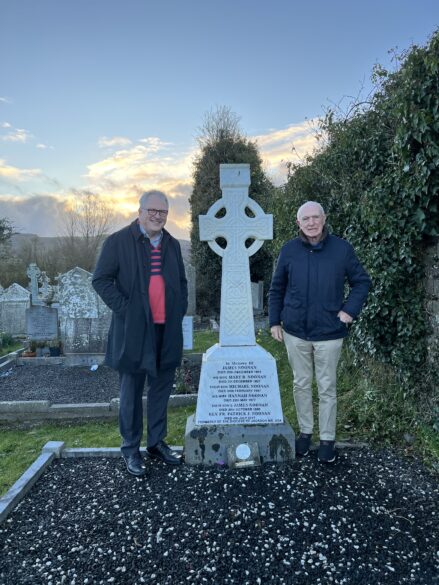
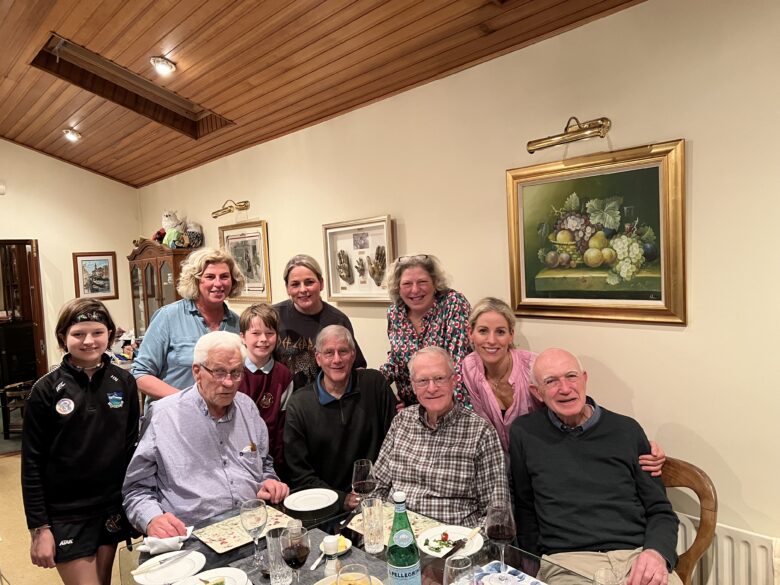
By Bishop Joseph R. Kopacz, D.D.
The Transfiguration of the Lord was proclaimed from all Catholic pulpits throughout the world last weekend on the second Sunday of Lent, an event revealing God’s beloved Son as the fulfillment of the Law and the Prophets with the appearances of Moses and Elijah. For a brief moment Peter, James and John beheld the eternal glory of God on the Lord who was calling them out of darkness into his own marvelous light. (Matthew 17:1-9)
Earlier in the Gospel of Matthew Jesus made a bold statement during his Sermon on the Mount. “Do not think that I have come to abolish the Law and the Prophets. I have come not to abolish them, but to fulfill them.” (5:17)

There was a strong prophetic component to Moses’ leadership, but generally he represents the Law in ancient Israel. As soon as Israel settled down in the promised land with a king to rule over them the prophetic ministry arose to preserve and to demand fidelity to the Covenant established by God with Moses on Mount Sinai. Jesus shouldered all of this sacred history on the Cross to establish the new Covenant in his blood. From the Law, the church for nearly 2000 years has preserved the Ten Commandments as the template for the moral life of the Christian. Section three of the Catechism devotes considerable ink to this tradition.
From the prophets primarily, the church has developed its social teaching over the past 150 years with the dawn of the modern world. Its foundation is the dignity of the human person, made in the image and likeness of God. During the season of Lent the Lord and the church call us to double down on our prayer, fasting and almsgiving as obvious signs of our repentance. Jesus has taught us how to pray, fast and die to self, challenging enough, but sometimes the hidden essentials of our mission in the world is the work of social outreach and advocacy for life, justice and peace.
At the end of Matthew’s Gospel, Jesus portrayed the final judgment based on feeding the hungry, giving drink to the thirsty, clothing the naked, caring for the sick and visiting the imprisoned. This was the vision of the prophets in Israel for centuries. Listen to Isaiah, first among them.
“Why, when we fasted, did You not see? When we starved our bodies, did You pay no heed, O Lord? Because on your fast day you see to your business and oppress all your laborers! Because you fast in strife and contention, and you strike with a wicked fist! Your fasting today is not such as to make your voice heard on high. Is such the fast I desire, a day for men to starve their bodies? Is it bowing the head like a bulrush and lying in sackcloth and ashes? Do you call that a fast, a day when God is favorable? No, this is the fast I desire: To unlock the fetters of wickedness and untie the cords of the yoke to let the oppressed go free; to break off every yoke. It is to share your bread with the hungry, and to take the wretched poor into your home; when you see the naked, to clothe him, and not to ignore your own kin.” (Isaiah 58:3-7)
For example, “not to ignore your own kin” is the impetus for the grassroots efforts to expand post-partum Medicaid for women and their newborn beyond two months of coverage up to one year. To ignore this critical need after Dobbs vs. Jackson Women’s Health Organization is unconscionable. This is to say that the church’s pro-life and social teachings are always at work, in Mississippi, in the United States and throughout our world because the powerful voices of the prophets are part of our religious DNA.
“Let justice roll like a river, righteousness like an unfailing stream.” (Amos 5:24) “He has showed you, O man, what is good, and what does the Lord require of you but to do justice, to love kindness, and to walk humbly with your God.” (Micah 6:8) This is an essential part of the fulfillment of the Law and the Prophets of which Jesus spoke, and that God the Father revealed on the mountain of Transfiguration. “This is my beloved Son, with whom I am well pleased; listen to him.” He is the Way and the Truth in whom we have been baptized and seek faithfully to follow in thought, word and deed.
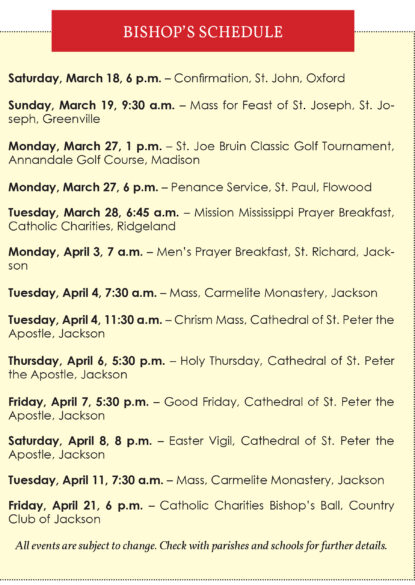
By Bishop Joseph R. Kopacz, D.D.
Once in a Blue Moon, a natural occurrence nearly every three years, the Gospel of Matthew flows seamlessly from Ordinary Time into Ash Wednesday. Since the Christmas season the church has been proclaiming our weekly Gospel from the Sermon on the Mount from the fifth chapter of Matthew. We are in Cycle A of our three-year rotation with the Gospels of Mathew, Mark and Luke.
This year the timing was picture-perfect to go from chapter 5 into the traditional Ash Wednesday Gospel taken from St. Matthew’s sixth Chapter on prayer, fasting and almsgiving. Recall that the Sermon on the Mount encompasses Chapters 5-6-7 in Matthew’s Gospel, the first book of the New Testament. The well-known words “repent and believe in the Gospel” or “remember that you are dust, and unto dust you shall return” as each person is marked with the ashes are the bridge to the Lenten season of conversion and new life in Jesus Christ. This is heaven-sent because the Sermon on the Mount is at the essence of the Lord’s standard for holiness of life, and an exceptional examination of conscience for our 40-day spiritual journey. Each chapter is brimming with God’s wisdom and by allowing Jesus’ words to find a home in our hearts and minds, and our actions will keep us firmly fixed on the road to life from on high .

Immediately following the Ash Wednesday Gospel on prayer, fasting and almsgiving is one of the Lord’s summary statements on storing up treasures in heaven. “Do not lay up for yourselves treasures on earth, where moth and rust consume and where thieves break in and steal, but lay up for yourselves treasures in heaven, where moth, rust and thieves are powerless.”
Why? “For where your treasure is, there will your heart be also.” (6:19-21)
As disciples of the Lord, the first foot forward is not about receiving pennies from heaven, as it is storing up treasures in heaven. “But seek first his Kingdom and his righteousness, and all these things shall be yours as well.” (Matthew 6:33)
We are in the world and for sure, want to live a full life, but we are not of the world. “I have given them your word; and the world has hated them, because they are not of the world, even as I am not of the world. I pray not that you should take them out of the world, but that you should keep them from the evil one.” (John 17:11, 14-15.)
The treasures we are storing up in heaven are rooted in prayer, fasting and almsgiving, or generosity of life, walking on the path Jesus trod, in the desert overcoming temptation, and as a treasure trove of blessing in daily life.
The Ash Wednesday demand to repent and believe in the Gospel is the foundation of the Lord’s call in each of our lives. St. Mark’s Gospel, without the Infancy Narratives of Matthew’s and Luke’s Gospels, and the Prologue of John’s Gospel wastes no time over who Jesus is and what are the demands of his mission. “The beginning of the Gospel of Jesus Christ, the Son of God.” (Mark 1:1) Immediately after his identity is established Jesus sets out on his public ministry. “After John was arrested, Jesus came into Galilee, preaching the Gospel of God saying, The time is fulfilled, and the Kingdom of God is at hand: repent, and believe in the Gospel.” (Mark 1:14-15)
Jesus invites us to place our faith in him as the Son of God and to repent, embracing a life-long journey of conversion of mind and heart, of mindset and attitude. We have been buried with Christ in baptism so that we can die to self and rise with him each day. This is not a once in a Blue Moon display of ashes, but a way of living with a storehouse of treasures.
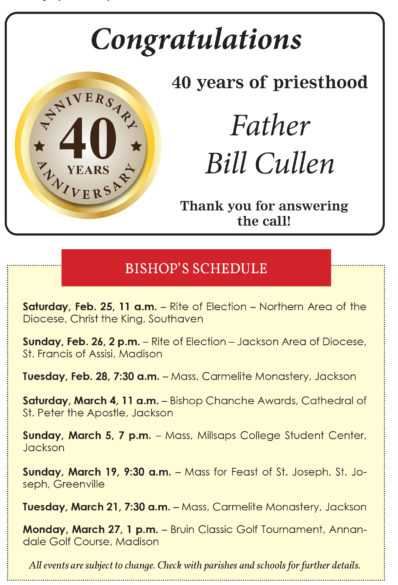
Por Obispo Joseph R. Kopacz, D.D.
JACKSON – Una vez en una Luna Azul, un acontecimiento natural que ocurre casi cada tres años, el Evangelio de Mateo fluye sin problemas desde el Tiempo Ordinario hasta el Miércoles de Ceniza.
Desde Navidad, la iglesia ha estado proclamando nuestro Evangelio semanal del Sermón de la Montaña del quinto capítulo de Mateo. Estamos en el Ciclo A de nuestra rotación de tres años con los Evangelios de Mateo, Marcos y Lucas.
Este año, el momento fue perfecto para pasar del capítulo 5 al tradicional Evangelio del Miércoles de Ceniza tomado del sexto capítulo de San Mateo sobre la oración, el ayuno y la limosna.
Recuerde que el Sermón de la Montaña abarca los capítulos 5-6-7 del Evangelio de Mateo, el primer libro del Nuevo Testamento.

Las conocidas palabras “arrepentíos y creed en el Evangelio” o “recordad que polvo sois, y en polvo volveréis,” dichas a medida que cada persona es marcada con las cenizas, son el puente hacia el tiempo de Cuaresma de conversión y vida nueva en Jesucristo.
Esto es enviado del cielo porque el Sermón de la Montaña es la esencia del estándar del Señor para la santidad de vida y un examen de conciencia excepcional para nuestro viaje espiritual de 40 días.
Cada capítulo está rebosante de la sabiduría de Dios y al permitir que las palabras de Jesús encuentren un hogar en nuestros corazones y mentes, y nuestras acciones nos mantendrán firmemente fijos en el camino a la vida desde lo alto.
Inmediatamente después del Evangelio del Miércoles de Ceniza sobre la oración, el ayuno y la limosna, se encuentra una de las declaraciones resumidas del Señor sobre el almacenamiento de tesoros en el cielo.
“No os acumuléis tesoros en la tierra, donde la polilla y la herrumbre destruyen, y donde ladrones penetran y roban; sino acumulaos tesoros en el cielo, donde ni la polilla ni la herrumbre destruyen, y donde ladrones no penetran ni roban; ” Mateo 6:19-20
¿Por qué? “porque donde esté tu tesoro, allí estará también tu corazón.” Mateo (6:21)
Como discípulos del Señor, el dar el primer paso adelante no se trata de recibir centavos del cielo, sino de acumular tesoros en el cielo. “ Pero buscad primero su reino y su justicia, y todas estas cosas os serán añadidas.” (Mateo 6:33)

Estamos en el mundo y seguro que queremos vivir una vida plena, pero no somos del mundo. “Ya no estoy en el mundo, pero ellos sí están en el mundo, y yo voy a ti….Yo les he dado tu palabra y el mundo los ha odiado, porque no son del mundo, como tampoco yo soy del mundo. No te ruego que los saques del mundo, sino que los guardes del maligno. ”(Juan 17:11, 14-15.)
Los tesoros que estamos acumulando en el cielo tienen sus raíces en la oración, el ayuno y la limosna, o la generosidad de vida, caminando en el camino que recorrió Jesús, en el desierto venciendo la tentación y como un tesoro de bendiciones en la vida diaria.
La exigencia del Miércoles de Ceniza de arrepentirse y creer en el Evangelio es el fundamento del llamado del Señor en cada una de nuestras vidas. El Evangelio de San Marcos, sin las Narrativas de la Infancia de los Evangelios de Mateo y Lucas y el Prólogo del Evangelio de Juan, no pierden el tiempo en quién es Jesús y cuáles son las exigencias de su misión. “Principio del evangelio de Jesucristo, Hijo de Dios”. (Marcos 1:1.) Inmediatamente después de establecer su identidad, Jesús emprende su ministerio público. “ Después que Juan había sido encarcelado, Jesús vino a Galilea proclamando el evangelio de Dios, 15 y diciendo: El tiempo se ha cumplido y el reino de Dios se ha acercado; arrepentíos y creed en el evangelio.” (Marcos 1:14-15)
Jesús nos invita a depositar nuestra fe en él como el Hijo de Dios y al arrepentimiento, abrazando un camino de conversión de mente y corazón, de mentalidad y actitud que dura toda la vida.
Hemos sido sepultados con Cristo en el bautismo para que podamos morir a nosotros mismos y resucitar con él cada día.
Esta no es una exhibición de cenizas única en la Luna Azul, sino una forma de vivir con un almacén de tesoros.
By Bishop Joseph R. Kopacz, D.D.
In the face of unrelenting violence in our world, in our nation and in our communities, our faith in the crucified and risen Lord offers another vision for living. During this stretch of time that we call Ordinary between the Christmas season and Ash Wednesday, we are blessed this year to hear the teachings of the Lord Jesus from the Sermon on the Mount (Matthew chapters 5-7), words that are anything but ordinary.
Rather, they provide a clear but demanding road to travel to embrace our identities as Christians, a way of life rooted in God storing up treasures in heaven. The following excerpts from the Sermon are a counterweight to the scourge of violence throughout our world with no one appearing to have a corner on the market with inhumanity.
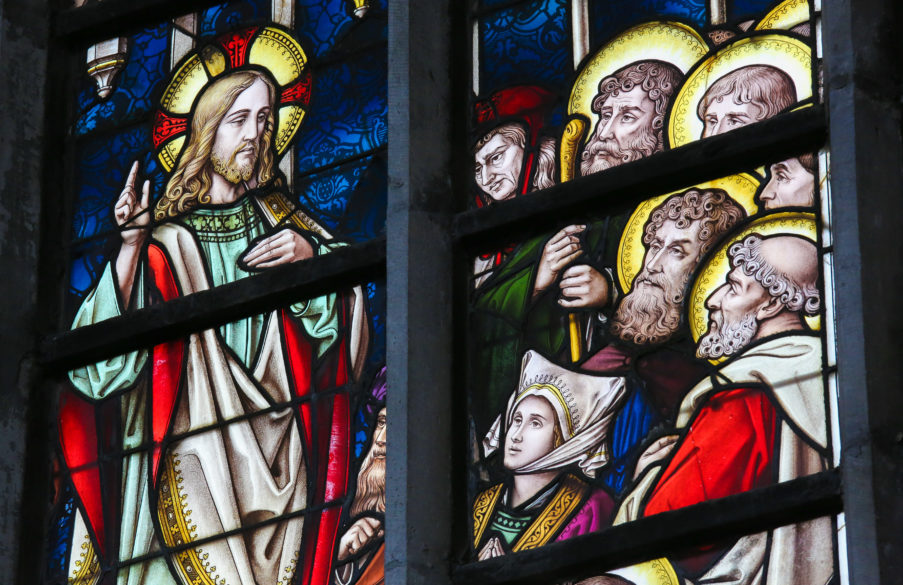
“Blessed are the Peacemakers, for they shall be called children of God.”
“Blessed are the merciful, for mercy will be theirs.”
“Blessed are they who mourn, they will be comforted.”
“Blessed are those who hunger and thirst for righteousness, theirs is the Kingdom of Heaven.”
“You are the salt of the earth; you are the light of the world … and your light must shine before all so that they may see your good works and give praise to your Father in heaven.”
“You have in your Law that you shall not kill, and anyone who kills will be liable to judgment. But I say to you that anyone who is angry with his brother shall be liable to judgment. Therefore, when offering your gift at the altar, if you should remember that your brother has something against you, leave your gift at the altar and first go to be reconciled with your brother. Then return and offer your gift.”
“Love your enemies. You have heard that it was said: ‘You shall love your neighbor and hate your enemy. But I say to you: “Love your enemies and pray for those who persecute you. This will make you children of your Heavenly Father. For he causes his sun to rise on the just and the unjust, and his rain falls on both the righteous and the wicked. If you love only those who love you, what reward will you receive? And if you greet only your brethren, what about that is so extraordinary? Therefore, strive to be perfect, even as your Heavenly Father is perfect.”
Some might respond to these Gospel imperatives, get real; this is not the way the world works. God might respond in turn; get real, my world is broken, and your way doesn’t appear to be working.
Blessed are the peacemakers. Pope Francis’ historic mission of peace last week to the Republic of the Congo, to the South Sudan and to other nations in Africa with the Archbishop of Canterbury, Justin Welby and Reverend Iain Greenshields, the moderator of the Presbyterian Church in Scotland is bringing the light of Gospel to these war weary and violence plagued countries. These ambassadors for Christ are pleading for peace, admonishing the political leaders over their failure to stabilize their countries, and in many cases, over their corrupt leadership.
On the other hand, Pope Francis spoke words of encouragement to the youth and young adults to break with the violence and to demand from their civic and religious leaders the paths of peace, stability and development. He also challenged the clergy, Catholic, Presbyterian and Anglican, to have a hunger for justice and peace and to not remain on the sidelines out of fear or hopelessness. It’s the Sermon on the Mount nearly two thousand years later.
We pray that the light of the Gospel of justice and peace can bring hope to the South Sudan, to the streets of America, to the cities of the Ukraine and to all who suffer from the oppression of violence in all forms. Like the Pope, the Archbishop and the Moderator, we pray for the desire to hunger and thirst for justice and peace so that our light may reflect the light, mind and heart of Jesus Christ. We are players and not bystanders who need to prevail in this struggle for humanity with far more at stake than who takes home the Super Bowl trophy.
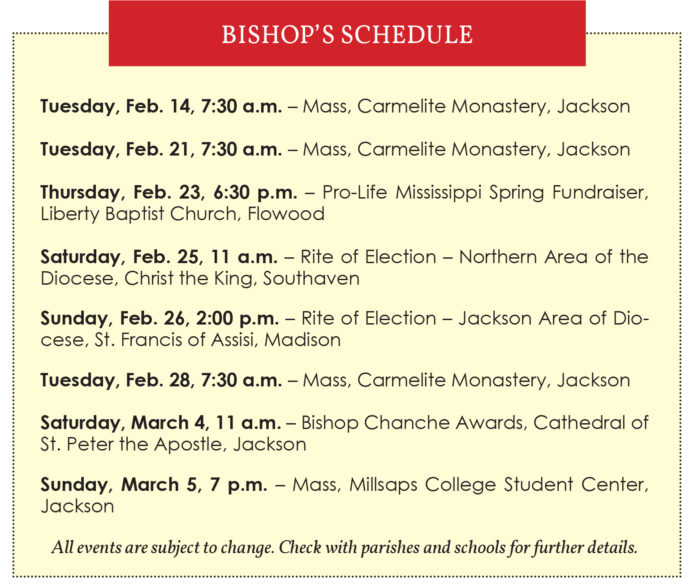
By Bishop Joseph R. Kopacz, D.D.
So, what’s new with the Synod on Synodality? Toward the end of 2021 Pope Francis had directed the church throughout the world to engage in the process we have come to know as the Synod.
Throughout 2022 each (arch)diocese, in one arrangement or another, responded to the pope’s vision and directive, and launched the process under the gaze of the Holy Spirit, producing a synthesis of the People of God’s joys and hopes and wounds along with a profound desire for all of what Jesus desired for his church.

In turn, nearly 200 (arch)dioceses in the United States by region, like streams of water, combined to form a flowing river in the National Synthesis document that reflects the work of approximately 700,000 Catholics. This was the inspired work of 2022.
Currently, all countries have entered into the Continental Stage and the United States is partnered with Canada. The goal is that further prayer and dialogue will refine the voices of nearly one million Catholics in the North American neighbors. During January several representatives from the Diocese of Jackson took part in the Continental Stage. What is produced at this level will go on to Rome for additional dialogue and discernment in anticipation of Pope Francis’ written Apostolic Exhortation in 2024, the fruit of the worldwide Synod.
The Catholic Church in the United States and in Canada are at the center of “western culture” a reality that offers opportunities and challenges that vary significantly from other parts of the world. The links to each country’s National Synthesis are available for your edification to better appreciate the common themes with our neighbors to the north, and also the pronounced differences.
Canada’s overall population is significantly less than the United States and its Catholic population mirrors this reality. There is a large indigenous population in western Canada, and Pope Francis modeled the spirit of Synodality when he visited last year to be with those so unjustly treated in their boarding schools, in order to listen, to pray, to honor their culture and to express his and the church’s sorrow over the pain that still afflicts the people.
On the other hand, the Province of Quebec in the East is extremely secular and “there is a desire for urgent change in order to regain – or preserve – what remains of the church’s relevance and mission.”
To one degree or another the Catholic Church in each country is responding to the promptings of the Holy Spirit to gather in prayer, discernment and respectful dialogue in order to see, to value the things that truly matter and to serve with the mind and heart of Jesus Christ.
The Synodal path has revealed the common ground between each of our countries. As Pope Francis modeled in Canada among the Indigenous, there was a high premium in both National Syntheses placed on the virtue of listening. At the core of being a welcoming church is a listening heart that takes a long and loving look at what is real.
“The value of simply listening is a clear message of the Synod process. People must be able to speak honestly on even the most controversial topics without fear of rejection. We must be open to new ideas and new ways of doing thing, even as we remain faithful to the church’s tradition. Faith formation can help us develop greater understanding and grow in trusting the Holy Spirit who is at work in every place and time.” (U.S. Synthesis)
Replete throughout the National Syntheses is the call for the church to fulfill the promise of Jesus for life in abundance. There ought to be far greater collaboration between the ordained and the laity in order to continue to build a culture of trust and transparency between the church’s leadership and the faithful. Reconciling the wounds of the past, reaching out to the alienated, accompanying those on the margins of society, and heeding the call to repentance and conversion demonstrate that the Kingdom of God is in our midst.
“As Pope Francis frequently reminds us, Synodality is not a one-time event, but an invitation to an ongoing style of church life. We have taken the first steps of this path, and we have learned much; we have more to learn and more to do as witnesses of Christ Jesus in our time.” (Intro, U.S. Synthesis)
Editor’s Note: For the Diocese Synod Synthesis, U.S. National Synod Synthesis and document on the Continental Stage of the Synod, visit www.jacksondiocese.org/synod.
Por Obispo Joseph R. Kopacz, D.D.
Entonces, ¿qué hay de nuevo en el Sínodo sobre la Sinodalidad? Hacia fines de 2021, el Papa Francisco había ordenado a la iglesia de todo el mundo que participara en el proceso que conocemos como el Sínodo.
A lo largo de 2022 cada diócesis y arquidiócesis, en una disposición u otra, respondió a la visión y directiva del Papa, puso en marcha el proceso bajo la mirada del Espíritu Santo y se produjo una síntesis de las alegrías y esperanzas y heridas del Pueblo de Dios, junto con un profundo deseo por todo lo que Jesús anhelaba para su iglesia.

A su vez, casi 200 arquidiócesis en los Estados Unidos por región, como corrientes de agua, se combinaron para formar un río que fluye en el documento de Síntesis Nacional que refleja el trabajo de aproximadamente 700,000 católicos. Este fue el trabajo inspirado de 2022.
Actualmente, todos los países han entrado en la Etapa Continental y Estados Unidos está asociado con Canadá. El objetivo es que más oración y diálogo refinarán las voces de casi un millón de católicos en los vecinos de América del Norte. Durante enero varios representantes de la Diócesis de Jackson participaron en el Escenario Continental. Lo que se produzca a este nivel irá a Roma para diálogo adicional y discernimiento, en anticipación a la Exhortación Apostólica escrita del Papa Francisco en 2024, fruto del Sínodo mundial.
La Iglesia Católica en los Estados Unidos y en Canadá están en el centro de la “cultura occidental”, una realidad que ofrece oportunidades y desafíos que varían significativamente de otras partes del mundo. Los enlaces a la Síntesis Nacional de cada país están disponibles para su edificación para apreciar mejor los temas comunes con nuestros vecinos del norte, y también las diferencias pronunciadas.
La población total de Canadá es significativamente menor que la de Estados Unidos y su población católica refleja esta realidad. Hay una gran población indígena en el oeste de Canadá, y el Papa Francisco modeló el espíritu de sinodalidad cuando visitó el año pasado para estar con aquellos que son tratados tan injustamente en sus internados, para escuchar, orar, honrar su cultura y expresar su dolor y el de la iglesia por el dolor que aún aflige al pueblo.
Por otro lado, la Provincia de Quebec en el Este es extremadamente secular y “hay un deseo de cambio urgente para recuperar, o preservar, lo que queda de relevancia y misión de la iglesia”.
En un grado u otro la Iglesia Católica en cada país está respondiendo a los impulsos del Espíritu Santo de reunirse en oración, discernimiento y diálogo respetuoso para ver, valorar las cosas que verdaderamente importan y servir con la mente y el corazón de Jesucristo.
El camino sinodal ha revelado el terreno común entre cada uno de nuestros países. Como el Papa Francisco modeló en Canadá entre los indígenas, hubo una gran importancia en ambas Síntesis Nacionales otorgadas a la virtud de escuchar. En el centro de ser una iglesia acogedora hay un corazón que escucha y mira con amor lo que es real.
“El valor de simplemente escuchar es un mensaje claro del proceso del Sínodo. Las personas deben poder hablar honestamente incluso sobre los temas más controvertidos sin temor al rechazo. Debemos estar abiertos a nuevas ideas y formas de hacer las cosas, aun cuando permanezcamos fieles a la tradición de la iglesia. La formación en la fe puede ayudarnos a desarrollar una mayor comprensión y crecer en la confianza en el Espíritu Santo que está obrando en todo lugar y tiempo”. (Síntesis de EE. UU.)
Repleto a lo largo de las Síntesis Nacionales está el llamado a la iglesia a cumplir la promesa de Jesús de una vida en abundancia. Debería haber una colaboración mucho mayor entre los ordenados y los laicos para continuar construyendo una cultura de confianza y transparencia entre el liderazgo de la iglesia y los fieles. Reconciliar las heridas del pasado, tender la mano a los marginados, acompañar a los marginados de la sociedad y atender el llamado al arrepentimiento y la conversión demuestra que el Reino de Dios está entre nosotros.
“Como el Papa Francisco nos recuerda con frecuencia, la sinodalidad no es un evento de una sola vez, sino una invitación a un estilo continuo de vida de la iglesia. Hemos dado los primeros pasos de este camino y hemos aprendido mucho; tenemos más que aprender y más que hacer como testigos de Cristo Jesús en nuestro tiempo.” (Introducción, Síntesis de EE. UU.)
Nota del Editor: Para encontrar la Síntesis del Sínodo Diocesano, Síntesis del Sínodo Nacional de Estados Unidos y los documentos del Estado Continental del Sínodo, por favor visite: www.jacksondiocese.org/synod.